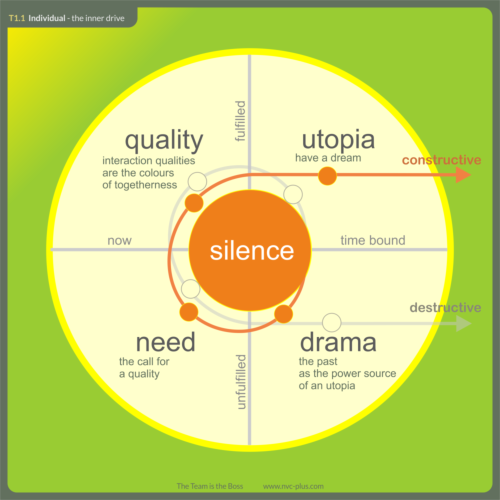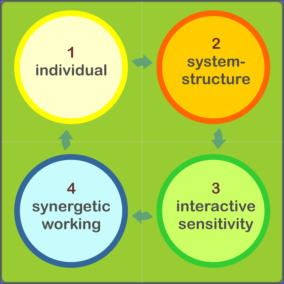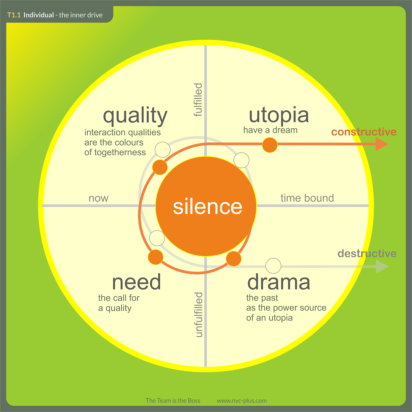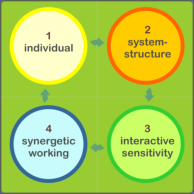Utopia and Vision

How to turn your team
into the boss


- The 6 Hurdles
- The Elements
- What are the Elements
- Culture Stage Model
- Gut, Head or Herart Process
- Culture Change
- List of Feelings and Needs
- Emergency Emo-Step
- Four Step Circle
- NVC Magic Circle
- Utopia Magic Circle
- Utopia and Vision
- No-Goes and Must-Haves
- Pain Points
- Consensus
- Requirement Lists
- NVC-plus Strategy
- NVC-plus Matrix
- Discourse
- Card Set
- Download-Tool-Depot
- FAQs
- Events
- Media

6 Hurdles to Self-Organization
Chapter 16 – Utopia and Vision




Successful
cooperation
is
both
a
path
and
a
goal.
Good
methods
and
tools
make
it
much
easier
for
a
team
to
organize
itself.
Encourage
your
team
to
take
the
first
steps
in
this
direction
and
experience the difference.
The cards are described in more detail in the book, as
well as in the Power Point presentation available in the
download tool depot.
Self-control
means
that
people
control
from
within
themselves.
If
we
ask
someone
random
about
politics,
environmental
protection
or
technology,
such
as
self-driving
cars,
we
will
hear
one
opinion.
If
we
ask
a
lot
of
people,
we
won't
hear
a
lot
of
opinions,
but
a
few,
some
of
which
are
very
similar.
We
tend
to
put
together
a
kind
of
patchwork
opinion
from
information
we
have
picked
up,
which
is
very
similar
to
the
opinions
of
many
others
who
do
the
same.
We
therefore
seem
to
be
more
opinion
leaders
than
opinion
formers.
Unfortunately,
opinions
are
unsuitable
as
a
central
element
for
constructive
self-direction,
because
they
have
too
little
to
do
with
ourselves
and
the
future
we
are
striving
for.
Personal
dramas
are
also
ruled
out
as
an
organizational
element.
Although
they
are
individual
and
also
contain
a
certain
amount
of
our
vitality,
they
are
unfortunately
directed
towards
the
past
and
are
more
concerned
with
avoiding
destruction
than
with
constructing
an
optimal
future.
A
person's
dramas
are
also
not
a
good
networking
point
for
others
who
have
their
own
dramas.
They
are
simply
very
individual
experiences.
In
classic
non-violent
communication,
we
work
with
needs.
These
are
very
similar
in
all
people
around
the
world
and
are
well
understood.
They
encourage
us
to
move
through
life.
However,
they
do
not
carry
any
further
design
logic,
which
is
why
in
classic
NVC
you
always
have
to
add
a
current
and
feasible
request.
Individual
problems
can
be
clarified
very
well
in
this
way,
but
it
is
difficult
to
imagine
organizing
a
system
with
this
communicative
effort.
So
we
need
a
common
forward-looking
and
positive
creative
direction
in
the
team.
So
we
came
up
with
what
we
call
utopia
as
a
starting
point.
You
can
also
call
it
a
dream,
individual
visions,
etc.,
but
the
term
utopia
gave
us the most pleasure.
The additional card T1.1
NVC-plus
has
several
tool
cards
that
are
numbered
consecutively.
Tool
card
1.1
is
the
first
tool
card
for
the
first
field
of
the
Four-Step-Circle
(small
card
on
the
right).
It
is
about
freeing
the
life
forces
that
are
stuck
in
dramas,
needs
and
qualities.
As
utopias,
the
life
forces
can
unfold
their
creativity
and
creative
power
and
are
available
for
joint
processes.
An
example:
The
partner
says:
"You'll
never
go
to
the
movies
with
me!"
Her
energy
comes
from
the
drama.
Then
she
thinks
about
the
needs
that
are
stuck
in
the
drama:
"I'm
all
about
more
connection,
fun
and
togetherness.
I've
been
missing
those
more
and
more
lately!
-
Her
energy
comes
from
the
need.
She
moves
on
to
the
next
circle
segment
of
the
tool
card:
"I'm
really
happy
and
joyful
when
I
think
about
how
we
have
more
togetherness,
connection
and
fun."
Now
her
energy
comes
from
the
qualities
of
togetherness,
connection
and
playing
together.
But
the
partner
doesn't
know
what
to
do
just
hearing
this
sentence.
Will
they
make
suggestions,
develop
feelings
of
guilt
or
both?
And
where
is
their
creativity?
She
can
come
to
the
last
circle
segment
of
the
tool
card
and
say:
"I've
just
realized
that
I
have
a
utopian
idea
for
our
evening
program:
Cinema
and
then
a
cozy
dinner."
Now
they
can
name
their
utopia
and
then
entangle
the
two
utopias
into
a
common
vision.
Of
course,
this
is
not
the
perfect
example
because
it
only
concerns
the
organization
of
a
brief
moment.
You
can
therefore
also
develop
a
weekly,
monthly,
annual
or
lifetime
utopia.
You
can
work
with
project
utopias,
company
utopias
or
problem-solving
utopias.
So
many
things
are
conceivable
and
you
should
not
pay
too
much
attention
to
utopias
that
are
too
big,
because
they
are
not
always as important as the small ones.



An utopia is an inspiring idea.

Every team, start-up, or company must overcome these six hurdles if it wants to organize itself
collegially in order to successfully manage projects from within the community.
An utopia is an inspiring idea.
Utopia and Vision


c) Utopia and Vison





Chapter 16 – Utopia and Vision


- The 6 Hurdles
- The Elements
- What are the Elements
- Culture Stage Model
- Gut, Head or Herart Process
- Culture Change
- List of Feelings and Needs
- Requirement Lists
- NVC Magic Circle
- Utopia Magic Circle
- Emergency Emo-Step
- Four Step Circle
- Utopia and Vision
- No-Goes and Must-Haves
- Pain Points
- Consensus
- NVC-plus Strategy
- NVC-plus Matrix
- Discourse
- Card Set
- Download-Tool-Depot
- FAQs
- Events
- Media
Self-control
means
that
people
control
from
within
themselves.
If
we
ask
someone
random
about
politics,
environmental
protection
or
technology,
such
as
self-driving
cars,
we
will
hear
one
opinion.
If
we
ask
a
lot
of
people,
we
won't
hear
a
lot
of
opinions,
but
a
few,
some
of
which
are
very
similar.
We
tend
to
put
together
a
kind
of
patchwork
opinion
from
information
we
have
picked
up,
which
is
very
similar
to
the
opinions
of
many
others
who
do
the
same.
We
therefore
seem
to
be
more
opinion
leaders
than
opinion
formers.
Unfortunately,
opinions
are
unsuitable
as
a
central
element
for
constructive
self-direction,
because
they
have
too
little
to
do
with
ourselves
and
the
future
we
are
striving
for.
Personal
dramas
are
also
ruled
out
as
an
organizational
element.
Although
they
are
individual
and
also
contain
a
certain
amount
of
our
vitality,
they
are
unfortunately
directed
towards
the
past
and
are
more
concerned
with
avoiding
destruction
than
with
constructing
an
optimal
future.
A
person's
dramas
are
also
not
a
good
networking
point
for
others
who
have
their
own
dramas.
They
are
simply
very
individual
experiences.
In
classic
non-
violent
communication,
we
work
with
needs.
These
are
very
similar
in
all
people
around
the
world
and
are
well
understood.
They
encourage
us
to
move
through
life.
However,
they
do
not
carry
any
further
design
logic,
which
is
why
in
classic
NVC
you
always
have
to
add
a
current
and
feasible
request.
Individual
problems
can
be
clarified
very
well
in
this
way,
but
it
is
difficult
to
imagine
organizing
a
system
with
this
communicative
effort.
So
we
need
a
common
forward-looking
and
positive
creative
direction
in
the
team.
So
we
came
up
with
what
we
call
utopia
as
a
starting
point.
You
can
also
call
it
a
dream,
individual
visions,
etc.,
but
the
term
utopia
gave
us
the most pleasure.
Successful
cooperation
is
both
a
path
and
a
goal.
Good
methods
and
tools
make
it
much
easier
for
a
team
to
organize
itself.
Encourage
your
team
to
take
the
first
steps
in
this
direction
and
experience
the
difference.
The cards are described in more detail in the
book, as well as in the Power Point
presentation available in the download tool
depot.
NVC-plus
has
several
tool
cards
that
are
numbered
consecutively.
Tool
card
1.1
is
the
first
tool
card
for
the
first
field
of
the
Four-Step-Circle
(small
card
on
the
right).
It
is
about
freeing
the
life
forces
that
are
stuck
in
dramas,
needs
and
qualities.
As
utopias,
the
life
forces
can
unfold
their
creativity
and
creative
power
and
are
available
for
joint
processes.
An
example:
The
partner
says:
"You'll
never
go
to
the
movies
with
me!"
Her
energy
comes
from
the
drama.
Then
she
thinks
about
the
needs
that
are
stuck
in
the
drama:
"I'm
all
about
more
connection,
fun
and
togetherness.
I've
been
missing
those
more
and
more
lately!
-
Her
energy
comes
from
the
need.
She
moves
on
to
the
next
circle
segment
of
the
tool
card:
"I'm
really
happy
and
joyful
when
I
think
about
how
we
have
more
togetherness,
connection
and
fun."
Now
her
energy
comes
from
the
qualities
of
togetherness,
connection
and
playing
together.
But
the
partner
doesn't
know
what
to
do
just
hearing
this
sentence.
Will
they
make
suggestions,
develop
feelings
of
guilt
or
both?
And
where
is
their
creativity?
She
can
come
to
the
last
circle
segment
of
the
tool
card
and
say:
"I've
just
realized
that
I
have
a
utopian
idea
for
our
evening
program:
Cinema
and
then
a
cozy
dinner."
Now
they
can
name
their
utopia
and
then
entangle the two utopias into a common vision.
Of
course,
this
is
not
the
perfect
example
because
it
only
concerns
the
organization
of
a
brief
moment.
You
can
therefore
also
develop
a
weekly,
monthly,
annual
or
lifetime
utopia.
You
can
work
with
project
utopias,
company
utopias
or
problem-solving
utopias.
So
many
things
are
conceivable
and
you
should
not
pay
too
much
attention
to
utopias
that
are
too
big,
because
they
are not always as important as the small ones.



The additional card T1.1







































